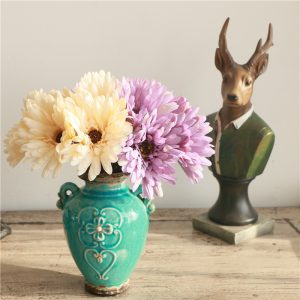🌸 Introduction
Artificial flowers have become one of the fastest-growing categories in retail, with global demand spanning from home décor to wedding boutiques and seasonal collections. While standard off-the-shelf products once dominated the market, leading retailers are shifting toward custom artificial flower collections. Why? Because customization offers a way to differentiate, strengthen branding, and meet consumer expectations in an increasingly competitive industry.
This article explores the reasons why major retailers prefer custom collections and how collaboration with factories and suppliers makes this possible.
🏬 1. Meeting Consumer Demand for Uniqueness
Modern shoppers are not satisfied with generic designs. They want artificial flowers that feel fresh, stylish, and aligned with current décor trends. By working with an artificial flower supplier to develop custom collections, retailers can offer something that competitors don’t.
For example, one retailer may curate pastel-colored roses for spring, while another assembles bold hydrangea bouquets for holiday promotions. Customization ensures the assortment reflects the unique tastes of their customer base.
🎨 2. Strengthening Brand Identity Through Custom Design
Retailers understand that branding extends beyond logos—it is about the entire shopping experience. Custom artificial flowers allow them to reinforce brand identity with consistent colors, packaging, and design elements.
A retailer targeting high-end clients may prefer silk flowers with realistic textures and premium packaging, while a mass-market chain may request budget-friendly polyester designs in bold, eye-catching shades. Partnering with a capable artificial flower factory ensures these requirements are met at scale.
📦 3. Flexibility in Packaging and Merchandising
Retail success is not only about the product itself but also how it is presented. Custom artificial flower collections give retailers control over packaging, labels, and assortment sizes.
Wholesale buyers often ask factories to design ready-to-sell packs with barcodes, branding, and seasonal themes. For instance, “Valentine’s Day Red Roses” or “Mother’s Day Peony Mix” collections can be pre-packed for store displays. This reduces in-store preparation time and provides a consistent look across multiple outlets.
✅ 4. Wholesale Efficiency and Inventory Management
Retailers prefer suppliers who can offer both customization and wholesale flexibility. The best partners provide low MOQs, mixed cartons, and tiered pricing for large-scale orders. This allows retailers to manage inventory effectively—testing new lines in smaller batches before scaling up with full collections.
Factories that can scale production quickly give retailers confidence during peak seasons. With reliable wholesale support, they can stock shelves with custom assortments without risking stockouts.
🧵 5. Quality Consistency Across Collections
One of the challenges in retail is ensuring that products remain consistent across hundreds or thousands of units. A strong artificial flower manufacturer uses strict quality control at every stage, from fabric inspection to assembly.
Custom artificial flowers are checked not only for durability but also for visual details such as petal shape, gradient coloring, and leaf finish. Retailers benefit because consistent quality builds trust with consumers—customers know they can expect the same look and feel every time they shop.
🌍 6. Aligning with Market Trends and Sustainability
Leading retailers are also quick to adopt trends. Whether it’s boho-themed arrangements, minimalist whites, or eco-friendly materials, custom collections allow them to stay ahead of changing consumer tastes.
Factories are responding by offering recycled fabrics, biodegradable packaging, and innovative textures. By sourcing wholesale artificial flowers that meet sustainability goals, retailers appeal to environmentally conscious shoppers while protecting long-term brand reputation.
🤝 7. Collaboration with Factories and Suppliers
The success of custom collections relies heavily on collaboration. Retailers work closely with artificial flower suppliers to communicate trends, color palettes, and packaging requirements. Factories then translate these ideas into tangible products.
This partnership approach transforms the relationship from a simple transaction into long-term cooperation. Retailers who build trust with reliable suppliers benefit from faster sampling, early access to new designs, and better wholesale terms.
🌺 Conclusion
Leading retailers prefer custom artificial flower collections because they deliver unique value to both brands and consumers. Customization allows them to differentiate in a crowded market, strengthen brand identity, and align with seasonal or cultural trends. Wholesale flexibility, quality assurance, and sustainable practices further enhance their ability to serve customers effectively.
By choosing the right artificial flower factory or supplier, retailers gain more than products—they secure reliable partners who help them innovate, adapt, and grow. In the global retail landscape, custom collections are no longer optional; they are a strategic necessity.








